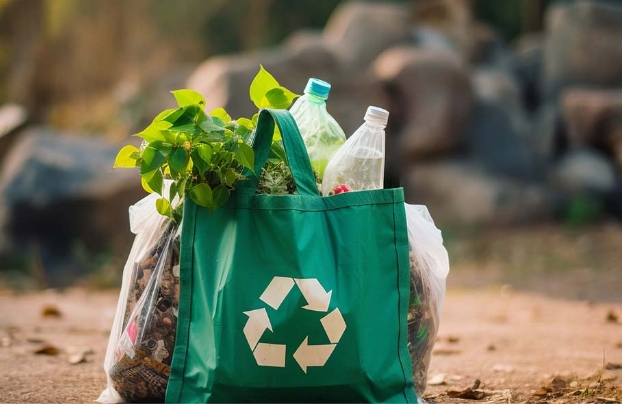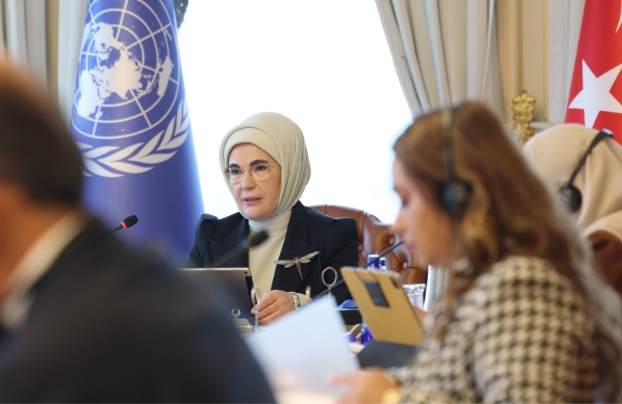Zero Waste

Minister of Environment, Urbanization, and Climate Change Murat Kurum answered journalists' questions at the COP27 summit held in Sharm El Sheikh, Egypt.
Turkey's Minister of Environment, Urbanization, and Climate Change, Murat Kurum, emphasized the necessity for Turkey to become self-sufficient in meeting its energy needs, stating, "Turkey has a historically negligible responsibility in emission production at just 0.6; we did not pollute this world." He noted that the deposit system will gradually become a habit, adding, "The essence here is the understanding of a circular economy: it’s not 'take and throw away,' but 'take, use, and return.' This applies to everything. We need to adapt our lifestyle to be compatible with climate change... Let's go back to our roots; there's no need to go too far. With our $3.157 billion agreement, we are providing significant financial support for our fight against climate change... We have raised our emission target for 2030 from 1.175 billion tons at 21% reduction to 41%."
During a meeting with journalists at the United Nations Climate Change Conference (COP27) held in Sharm El Sheikh, Egypt, Minister Kurum elaborated on the details of Turkey's Nationally Determined Contributions (NDC). He highlighted the importance of actively participating in the process by sharing both the accomplishments and future projects with his counterparts from participating countries.
Kurum stated that discussions at COP meetings often revolve around the UN's Kyoto Protocol and Paris Agreement, where specific decisions and actions are taken and experiences shared among countries. He mentioned, "For us, this is valuable. We passed the Paris Agreement in our parliament. With the decision of our President, we have set our target for 2023 to achieve net-zero emissions and a circular green economy. We have begun working towards these goals."
Recalling Turkey's intended nationally determined contribution submitted to the UN Framework Convention on Climate Change on September 30, 2015, Kurum indicated that they had initially projected emissions to be 1.175 billion tons by 2030. However, he asserted, "We will not achieve 1.175; we will reach 929 million tons," reflecting a 20% reduction in growth. He explained, "We are a developing country, and we have not yet reached our highest emissions. Therefore, we stated that we would conduct this process without hindering the country's development while signing the Paris Agreement." Kurum pointed out that between 1750 and 2019, the emissions of the U.S. accounted for 24.8%, the EU 17%, and China 13%, while Turkey's historical responsibility stands at just 0.6%.
Regarding Turkey's greenhouse gas emissions, Kurum provided figures indicating that "in 2020, we produced 523 million tons of emissions. Our reference scenarios show that we consistently remain below these references. In 2020, emissions were expected to be 599 million tons, but we achieved 506 million tons, which is 21% below our commitment. Per capita, we produced 6.3 tons of emissions."
Kurum noted that energy-related emissions constitute the largest share, at 70.2%, followed by agriculture at 14%, industrial processes at 12.7%, and waste management at 3.1%. He stated, "In this regard, we conducted a comprehensive study involving seven sectors, including industry, tourism, and transportation, with all our ministries. During this work, we held a climate council where ideas from civil society organizations, academics, and experts were discussed. This resulted in 217 decisions that became the foundation of our work. Consequently, we updated our national contribution declaration because if we aim to achieve net-zero emissions by 2053, we need to promptly update our declaration to demonstrate our commitment."
He highlighted that the updates to the national contribution declaration are accompanied by the preparation of long-term climate strategies, which will be included in the climate law. "The climate law will serve as the foundation for the work that will be done. With this foundation, all sectors will take steps supported by the climate law’s financial assistance, including the implementation of the emissions trading system," he added.
Kurum also discussed that they are focusing on reducing emissions across seven sectors by 2030, targeting a maximum emission of 695 million tons. "Thus, by 2030, we aim to reduce emissions by 500 million tons compared to our previous commitment, effectively making it nearly double our old commitment," he explained, noting that peak emissions are expected in 2038, after which they will start to decline.
Highlighting the importance of climate-friendly materials in new projects, Kurum stated, "In our decisions, we are now using climate-friendly materials, insulation, and renewable energy in buildings and industries, pushing them to the required levels. We will make the use of climate-friendly materials mandatory in the future. We have made the use of renewable energy in industrial facilities and buildings compulsory, and we will continue to increase these rates."
Kurum acknowledged Turkey as a developing country, stating, "We are still making many of our investments. While we have completed our infrastructure, we are still in the process of industrialization. Our investment, employment, and production policy, as outlined by our President, relies heavily on these developments, especially as we undertake many of these investments for the first time."
Emphasizing the importance of a sustainable and nature-conserving development approach, he concluded, "We will continue our development with an understanding that protects biodiversity, places humans at the center, and conserves the environment, nature, and ecosystems. We must be conscious of the limitations of our resources as our population grows, and we must increase our carbon sinks."



